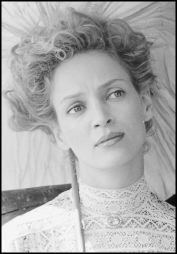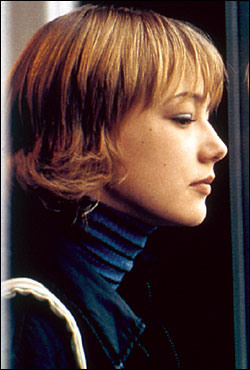Two eminences, now getting a little gray around the muzzle, had a rare face-off this weekend in New York and Los Angeles movie theaters. Actor-director-co-producers Warren Beatty and Robert Redford showed up with what’s been occupying them of late: Beatty’s Bulworth, on the sorry-ass state of politics today, and Redford’s The Horse Whisperer, body- and soul-mending, cowboy style.
The Horse Whisperer
directed by Robert Redford
starring Robert Redford, Kristin Scott Thomas, Dianne Wiest
Bulworth
written and directed by Warren Beatty
starring Warren Beatty, Halle Berry, Oliver Platt, Amiri Baraka, Paul
Sorvino
See end of article for related links.
Beatty has an additional credit; he’s Bulworth‘s co-writer, with Jeremy Pikser. However, you can bet that although Redford didn’t write his movie (Eric Roth and Richard LaGravenese did), there isn’t so much as a horsefly in it that he didn’t sign off on. As filmmakers, Beatty and Redford have black belts in micromanagement.
If there were ever a moment when one could cry, “Auteur, auteur,” this would be it. So it may be the time to look at this pair of certified superstars as they reach a certain age (they both turn 61 this year), at the risks—if any—they take, and how they manipulate that thing called image.
Artistically, they’re of equal heft: They’ve each directed four films (actually Beatty co-directed Heaven Can Wait) and each has won an Oscar for his pains—Beatty for Reds and Redford for Ordinary People. Both are stingy with their appearances on screen, and legendarily vain. And although Bulworth and The Horse Whisperer are hardly last hurrahs, these pictures may be career high water marks.
Warren Beatty and Robert Redford are thoughtful, conscientious men; when they hit the subjects that move them, that conscientiousness can turn obsessive. Pump-priming audiences for his movie, Beatty recently put his thoughts, chiefly political, on view in a hefty New York Times Magazine interview—with, of course, the cover picture: one doesn’t give something for nothing—and on a full hour of Charlie Rose. Likewise, Redford’s views—old politics, the new movie, the barest morsel of himself—are currently aired in a long, soft New Yorker piece. (Reading Redford’s anecdote about Ethel Kennedy giving him flack for playing a Kennedy-like politician in The Candidate, a casual reader would assume that Redford directed rather than simply executive-produced the film. Pace Michael Ritchie. Similarly, Alan Pakula has vanished as the director of All the President’s Men, as its co-star talks animatedly about his own role in its making.)
Where Beatty and Redford separate is in temperament and, crucially, humor. In the New Yorker article, more than one man who knows Redford well swears that there’s “a crazy guy,” a wild man, a “bear” inside. If so, that bear must have nearly starved to death. Beatty is on intimate terms with his crazy side, and he’s played to it more than once (take another look at McCabe and Mrs. Miller).
At some point, the Sundance Kid made a choice: Between actor and movie star, he opted for movie star. Butch Cassidy, on the other hand, chose acting, which is why you will have a better, more nourishing time watching Paul Newman in Twilight or The Verdict, or even Mr. and Mrs. Bridge than any Redford performance over the same period.
It seems to have taken Redford a long while to get really comfortable with the idea of stardom, even after Butch and Sundance. He never seemed to glory in the idea until maybe The Natural, the most completely specious vision of both America and baseball since Norman Rockwell. That one fixed the image of what Paul Newman has called Redford’s “incorruptible masculinity”; even his teeth seemed to twinkle.
Since that time, Redford has had a sureness about his choices: He knows why he’s a star and what makes him one, and he doesn’t make mistakes. Indecent Proposal cemented his movie-star image. Everyone else took heat for being in it; he came away unscathed. Up Close and Personal was the paradigm of what stars can do—in this case two of them—and critics cheered Redford and Pfeiffer for their pure skill at it.
All the more reason to be caught off guard by The Horse Whisperer. Every filmmaker should frame the words of Charles Brackett, writer, producer, frequent collaborator with Billy Wilder. Asked what made a movie successful, he said: “Make audiences want something really badly. Then give it to them.”
You can bet audiences will want something in The Horse Whisperer. They want what Clint Eastwood was smart enough to give them in Madison County. After two and one-half mortal hours of not getting it in Whisperer, they may start fires in the aisles.
It’s not simply the story of a cowboy-savant who lovingly cures a damaged horse and its damaged adolescent owner. It’s also about the cowboy and the married lady (Kristin Scott Thomas) and the nice, growing animal attraction between them. Then abruptly, through hubris, or modesty, or willful misreading, Redford puts on the brakes. In a choice the Moral Majority will love, Scott Thomas must be content with an erotic waltz and a very long drive back to Manhattan. No, no, no, no, no. First the sex, then the drive home.
From someone whose judgment has rarely failed him, this is jaw-dropping. Redford obviously believes that his beloved vistas, homilies about ranching life, the mysterious horse fixing and his own burnished image will carry the day. You can only hope he didn’t bet the farm.
Beatty, on the other hand, seems not to give a damn, and it’s irresistible. The irony here is that Beatty, supposedly the farceur, the eternal ladies’ man, only lately domesticated, has in some circles been taken less seriously than Redford. Well, Redford had Sundance, Beatty had Madonna. Now Beatty has Annette Bening and Madonna’s poster artist—who says the man’s not smart?
Yet it’s Beatty who has dug down into his disgust and disillusion at what he sees around him, and found a way to give it a voice. To call Bulworth “tragic farce,” as Beatty likes to, is a mite high-falutin’, but it’s as astringently un-PC as its poster drawing. Its wildest conceit finds J. Bullington Bulworth, a morally bankrupt ex-liberal senator, truth-telling in hip-hop after he’s spiraled into a breakdown. OK, it’s pretty excruciating white man rap, but as social commentary it’s blunt and slashingly funny.
The noted black Harvard historian Henry Louis Gates Jr., in giving his crucial OK to Bulworth in The New Yorker, suggested that it plays “as if Beatty had optioned the film rights to a month’s worth of editorials in The Nation.” (In case anyone thought Gates had lost it, he also said that Bulworth’s rap sounded “like a pissed-off Edgar Guest.”)
There’s no precedent for Bulworth, a genie that may have been bottled up a very long time. What some people forget is that it comes from an utterly fearless actor. Because Beatty didn’t look to the screen for his image, he could be impotent in Bonnie and Clyde, dim in the razor-sharp Shampoo, and an ineffective jackrabbit of a loser in McCabe and Mrs. Miller.
Of course, in Bulworth he does have the chutzpah to have Halle Berry choose his sorry 61-year-old self over every other man she’s ever met. Pure reflex, I guess.
Related Links:
Horse Whisperer video trailer
http://movielist.simplenet.com/h/horsewhisperer.html
Warren Beatty info.—including zodiac sign and pictures
http://www.celebsite.com/people/warrenbeatty/index.html
Robert Redford info.







